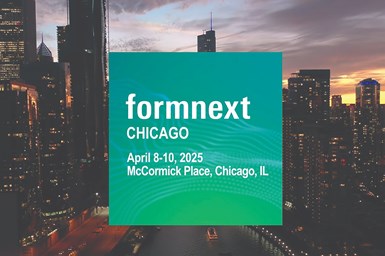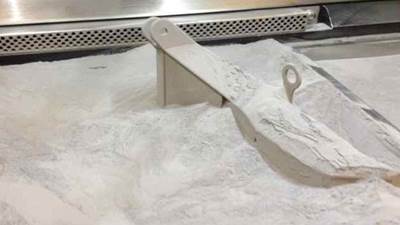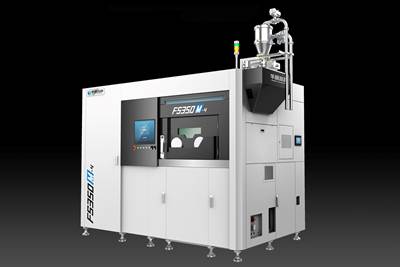Sustaining the Growth of Additive Manufacturing Through Market Development
Reaching the next stage of additive technology’s development depends on the evolution of the current market.
A gateway attracts attention of interested visitors at the entrance to the AM Sector, featuring industrial AM companies, at IMTS in the West Building. IMTS 2024 is Sept. 9-14 at McCormick Place in Chicago.
In the decades since AMT – The Association For Manufacturing Technology welcomed its first member that specialized in additive manufacturing (AM), additive has revolutionized business models, supply chain strategies and the needs of the market.
While the technology has significantly matured, reaching its next stage of development depends on the evolution of the current market. That will require developing opportunities to showcase the latest AM solutions, software and strategies, as well as changing how OEMs, service providers and investors think of AM to better grasp its potential — that it’s more than just 3D printing a part.
Growing Manufacturing’s Ecosystems
AMT — which produces IMTS – The International Manufacturing Technology Show, the largest manufacturing trade show in the Western Hemisphere — sees advancing AM as part of its core mission and 120-year legacy of advancing the industry through emerging technologies.
One key pathway to accomplishing this is to expand the opportunities AM brings to the industrial manufacturing industry. AMT has partnered with Mesago Messe Frankfurt and Gardner Business Media (GBM) to create a series of events in the United States featuring Formnext, the Mesago-produced international meeting hub and leading global industry platform for AM.
“From a trade show perspective, the Formnext environment will allow visitors to understand how additive manufacturing fits into the broader ecosystem of mainstream manufacturing,” says Glynn Fletcher, president of EOS North America, in a video spotlight about Formnext Chicago at www.formnextchicago.com/post/mainstream.
From materials to software to printing to postprocessing and much more, Formnext offers a full, interconnected suite of solutions for manufacturers to improve their shop operations and bottom line. Its upcoming events in the United States include:
- The Additive Manufacturing Sector, accelerated by Formnext, at IMTS 2024, Sept. 9-14, McCormick Place, Chicago, Illinois — IMTS.com
- Formnext Chicago, April 8-10, 2025, McCormick Place, Chicago, Illinois — FormnextChicago.com
- Formnext Forum Austin, Spring 2026, Austin, Texas — FormnextForum.com
“IMTS showcases AM’s role within the industrial ecosystem so manufacturers can learn how to apply AM to their existing business and create new opportunities,” says Douglas K. Woods, AMT president. “Formnext Chicago showcases the entire breadth and depth of the AM ecosystem to help manufacturers choose and use the correct technologies. And the Formnext Forum emphasizes technical education to accelerate AM growth. AMT is leveraging our experience and creating opportunities for OEMs, job shops, specialized service providers, startups, innovators and investors to strengthen manufacturing in the USA.”
Fulfilling AM’s Potential
In addition to the Formnext USA events, the AM market will need to shift its perspective to a holistic understanding of how AM fits into manufacturing, notes Dave Burns, an industry leader and senior advisor to AMT, who co-founded 3D printing company
ExOne, served as president and CEO of Gleason Corp., and is also the founder and principal of Global Business Advisory Services.
“To fully unleash the power of digital manufacturing technologies such as AM, we need a view of manufacturing that includes elements of conceptualization, materialization and utilization,” Burns says.
Conceptualization encompasses the technologies inventors and engineers use to conceive and design products. Materialization extends through the various steps of object creation, such as material selection and sourcing, technologies related to object formation, part completion and validation, and the location of these activities (such as manufacturing closer to the point of use and reshoring). Utilization includes assessing object use and performance (such as digital data capture and analysis) and disposal or reuse.
Burns notes in a recent video from Formnext — featured on IMTS+ at IMTS.com/AdvfnxtIntegrate — that AM can benefit everyone on the planet through more freedom of design and materials — a freedom he believes we may not see again in our lifetime; the velocity of bringing products to market; and sustainability — notably through a reduced carbon footprint. Burns concedes that while there are significant hurdles to overcome, “if we stay with it, the endgame is so profound that it’s worth the trip.”
AMT’s Dedication
Despite AM’s tremendous growth, expansion, and even turbulence and volatility over the last quarter century, AMT’s commitment to its adoption in our community for competitiveness and sustainability has remained steadfast — and eager.
“AMT’s goal is to accelerate growth and spur AM entrepreneurial activity by showcasing the technologies, companies and innovative successes of the industry,” Burns says.
“AM has a double-digit average growth rate of 14%-15% year over year, with the market projected to grow to $28.9 billion globally by 2028,” says Dayton Horvath, director, emerging technology and investments at AMT. Because the pace of technology growth is directly linked to capital investment trends, AMT also provides information on AM investment trends as part of its market research offerings.
AMT projects that further growth will come from manufacturers evolving their understanding of AM from a specialized vertical to an integral manufacturing technology used across all end markets. Combined with the upcoming Formnext events in the United States, AM promises to leave a long-lasting mark on the world — the likes of which may not be seen again until AMT reaches another 120 years.
Read Next
3D Printed Polymer EOAT Increases Safety of Cobots
Contract manufacturer Anubis 3D applies polymer 3D printing processes to manufacture cobot tooling that is lightweight, smooth and safer for human interaction.
Read MorePostprocessing Steps and Costs for Metal 3D Printing
When your metal part is done 3D printing, you just pull it out of the machine and start using it, right? Not exactly.
Read MoreBike Manufacturer Uses Additive Manufacturing to Create Lighter, More Complex, Customized Parts
Titanium bike frame manufacturer Hanglun Technology mixes precision casting with 3D printing to create bikes that offer increased speed and reduced turbulence during long-distance rides, offering a smoother, faster and more efficient cycling experience.
Read More














